|
|
|
Sort Order |
|
|
|
Items / Page
|
|
|
|
|
|
|
| Srl | Item |
| 1 |
ID:
153612
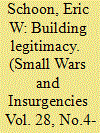

|
|
|
|
|
| Summary/Abstract |
Previous research has identified a variety of general mechanisms to explain how insurgents build legitimacy. Yet, there is often a gap between these mechanisms and the interactional dynamics of insurgencies. This article attempts to bridge this gap through a theoretically informed analysis of the Kurdistan Workers’ Party’s (PKK) insurgency in Turkey. I show how the PKK’s efforts to cultivate legitimacy, Turkey’s counterinsurgency strategies, and civilian perceptions of the PKK, all mutually influenced one another. Based on this analysis, I argue that the mechanisms that produce popular legitimacy coevolve with insurgents’ behaviors, states’ interventions, and civilians’ perceptions.
|
|
|
|
|
|
|
|
|
|
|
|
|
|
|
|
| 2 |
ID:
119498
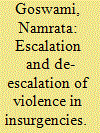

|
|
|
|
|
| Publication |
2013.
|
| Summary/Abstract |
Insurgencies in the Northeast of India have been a recurring phenomenon since India's independence in 1947. One of the most significant aspects of the multiple insurgencies has been the use of violence for political goals. By drawing upon three cases of insurgencies in Northeast India, the article offers a conceptual framework on escalation and de-escalation of violence in insurgencies. The article argues that the most critical variables which have a direct bearing on the levels of insurgent violence are: popular support, loss of legitimacy and the state's counter-response.
|
|
|
|
|
|
|
|
|
|
|
|
|
|
|
|
| 3 |
ID:
113210
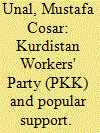

|
|
|
|
|
| Publication |
2012.
|
| Summary/Abstract |
The PKK has been a prolonged problem in Turkey, and various measures have been adopted to diminish and end the violence. In addition to the impacts on violence, these policies have also had an impact on public opinion and ethnic awareness of Kurds in Turkey. This article analyzes these policies and their effects on electoral support for the PKK by examining the vote shares of the pro-PKK political parties in national and local elections. It concludes that Turkey has conceptualized the issue solely as a problem of terrorism, but the goal, strategy, organization, and format of violence used by the PKK reflect the nature of an insurgency. Therefore, it is argued that Turkey, by ignoring the insurgency features, has disregarded the legitimate parts of the cause and related popular support, and thus has responded mostly with deterrent measures apart from the reforms of recent years. Results have shown that policies of deterrence culminated in a steady level of support for the PKK indicating that low level of legitimacy - as they were perceived by the people - of the policies resulted in viable popular and political support for the PKK. Despite the recent accommodative reforms, the existence of pro-PKK parties rallying electoral support in the political arena provided sustained level activities in the conventional politics in Turkey's municipal and national political system, in which they pursue pro-PKK agendas, such as 'Autonomy' and 'Confederation' as well as activities to increase the distinction in identity around the ethnic consciousness for more popular support. Yet, no clear pattern is identified between violence level and popular support in the macro-scale.
|
|
|
|
|
|
|
|
|
|
|
|
|
|
|
|
| 4 |
ID:
167378
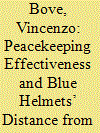

|
|
|
|
|
| Summary/Abstract |
United Nations (UN) peacekeeping missions are complex social organizations, with soldiers coming from several countries. In this environment, effective communication and interactions with local populations are often difficult, and establishing essential local support can be jeopardized when soldiers are culturally distant from local communities. At the same time, however, when local populations perceive peacekeepers as sufficiently distant or unbiased, the promotion of cooperation is enhanced. We explore whether cultural distance—in terms of geography, language, and religion—and social distance—in terms of economy and institutions—between the peacekeepers and the local population improve the operational capabilities of a mission. We use monthly information on UN peacekeeping missions’ composition from 1990 to 2015. We find that higher geographic and cultural distances correspond to higher levels of violence against civilians and higher battle deaths, whereas institutional and economic differences have the opposite effects, although these are less robust.
|
|
|
|
|
|
|
|
|
|
|
|
|
|
|
|
| 5 |
ID:
173885


|
|
|
|
|
| Summary/Abstract |
Existing research on terrorism as a strategy has largely neglected the apparent differences in what groups target. Whereas some organizations primarily target undefended civilians, others attack mainly official and hard targets. I develop an explanation of terrorist groups’ relative target preferences based on how a group’s ties to its constituency and specific government repressive strategies either constrain or incentivize terrorist attacks against soft civilian vs. hard/official targets. Specific sources of support and the degree of out-group antagonism in their constituency shape terrorist groups’ primary targeting strategy. While groups with transnational support are generally more likely to target primarily undefended civilians, not all groups with local support are restrained. Groups with low out-group antagonism and local civilian support incur high political costs for targeting civilians and focus primarily on official targets. Instead, groups with domestic support but high out-group antagonism have mixed incentives. When facing indiscriminate government repression these groups become more likely to target primarily undefended civilians, because they can justify such a response to their audience, direct attacks against out-group civilians, and radicalize local constituents. Indiscriminate repression, however, does not change the targeting strategy of groups who face high political costs for attacking civilians. I examine the observable implications of the theory in a comparative analysis of terrorist organizations (1995–2007) as well as an over-time analysis of repression and targeting in the Israeli–Palestinian conflict (1987–2004), and find strong support for the theoretical argument.
|
|
|
|
|
|
|
|
|
|
|
|
|
|
|
|
| 6 |
ID:
092872
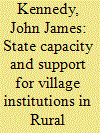

|
|
|
|
|
| Publication |
2009.
|
| Summary/Abstract |
For successful political reforms, such as village elections or elimination of arbitrary fees, the central party-government must have the political capacity to implement new laws down to the village level. Thus for researchers as well as government officials, it is important to have accurate measures of reform success or failure. There are two equally important measures that are closely tied to state capacity. One measure is the top-down level of commitment that county and township officials have towards implementing reforms. That is, whether these new institutions exist and function at the village level. The second measure is the bottom-up villager evaluation of local institutional procedures and cadre behavior. Using data collected in one northwest province in 2000 and 2004, findings show that implementation of some reforms, such as village elections, is uneven, while other reforms, such as the 2002 tax-fee reforms, were more successful. There are two implications from this study. One is that the central party-government lacks the commitment rather than the capacity to fully implement village elections. The urgency of relieving villagers' tax-fee burdens that were perceived as the source of rural unrest and instability was more important than the development of village elections. Second, in villages where the reforms are fully implemented, villagers make a clear conceptual distinction between popular support for the elected leaders and the election process. That is, they display disgust for the elected leaders and support for the election process and the village fee system. However, in villages where reforms are not fully carried out, villagers exhibit a more uniform lack of support for leaders and local institutions.
|
|
|
|
|
|
|
|
|
|
|
|
|
|
|
|
| 7 |
ID:
172174
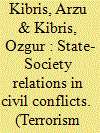

|
|
|
|
|
| Summary/Abstract |
Civil conflicts are conceptualized as asymmetric, population-centric military struggles. The argument is that insurgencies, even though they are no match in military power to their state adversaries in many cases, resort to armed struggle nonetheless as a tool to impair state capacity, the quality of governance, and the ability of the state to honor the “social contract” in order to eventually destroy state authority and render the state irrelevant for the society. Note that this argument implies that state-society relations do react to the military course of the conflict. In this article, we provide empirical evidence for this implication. Introducing a new panel dataset on the long-running civil conflict in Turkey, we first conduct a micro-level analysis and demonstrate the significant impact rebel presence has upon state-society relations across localities and time. We then analyze the results of semi-structured interviews we had conducted with a group of experts from the conflict regions to decipher the possible mechanisms behind the association we observe in the data. The interviews support our motivating theoretical argument.
|
|
|
|
|
|
|
|
|
|
|
|
|
|
|
|
|
|
|
|
|